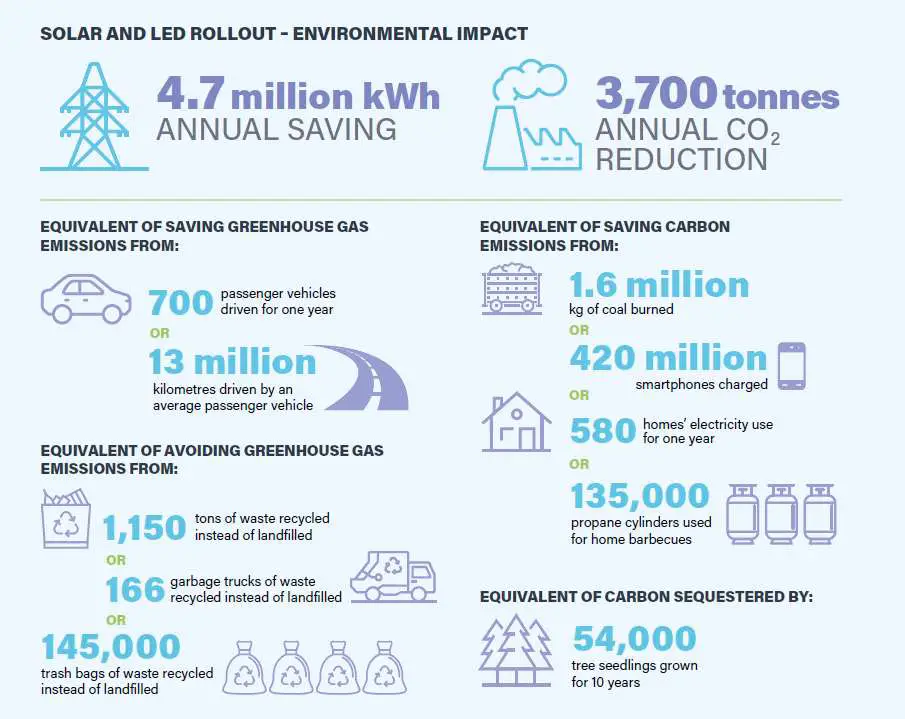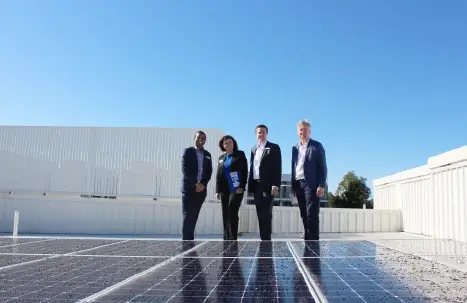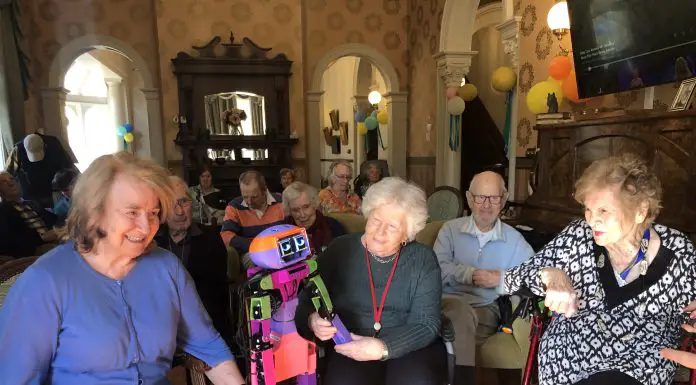This article is part of our showcase of the 2019 Future of Ageing Awards. Regis was the winner of the Sustainability category.
Regis was the first aged care provider in Australia to formally launch a sustainability program and inaugural Sustainability Report in October 2018.
Regis has since embedded its sustainability program called “Taking Our First Steps”, into its operations. The program comprises a clear strategy and action plan outlining how the company will meet its pledge to act on climate change.
Project Overview
Regis recognises that as one of the leading Australian aged care companies, we have an important role to play in sustainability. Whilst this issue is not unique to aged care, with the growth in the aged care sector linked to the increasing population ageing, we believe there is a sound social, environmental and economic basis to address.
The consumption of resources (energy and water) and generation of waste will increase as demand on the aged care sector increases. Regis has assessed where we can introduce or improve efficiencies, including through building design, operational arrangements to reduce energy and water consumption and identifying alternative energy sources.
Regis recently joined the Victorian State Government’s climate change pledge program, TAKE2. Delivered by Sustainability Victoria, TAKE2 is a program that provides every Victorian business, local government, community organisation and home with the information they need to act on climate change.
Regis is one of more than 1,000 businesses that have taken the pledge and part of a 12,000-strong network of Victorians working together to achieve two important targets by 2050 – achieving zero-net emissions and keeping global temperature rise to under two degrees.
How it came together
The development of the sustainability program involved five key steps:
1. Desktop Analysis
2. Stakeholder Consultations
3. Benchmarking Exercise
4. Energy Target Reduction
5. Sustainability Strategy
The desktop analysis took into account a variety of issues that would influence the development of the ‘Taking Our First Steps’ sustainability program.
The team considered the key drivers underpinning the importance of sustainability within Regis, including resident health, good corporate governance, reputation, business disruption, employee engagement and cost reduction. We then plotted out sustainability-related risks on an organisational risk chart in order to understand the impact of those risks on any sustainability program they developed.
The team undertook a SWOT analysis, and then developed a list of material issues to Regis and its stakeholders in the context of sustainability. These included business disruption, current and future resource costs, regulations and sustainability reporting and risk exposure arising from a changing climate.
After this initial research, we presented and facilitated workshops at each home to engage with residents, facility management and frontline staff around Regis’ current and future sustainability agenda.
In addition to frontline stakeholders, we conducted extensive consultation with each member of Regis’ Executive team, asking them to identify what sustainability means to them, why they feel sustainability is important, how they assessed our current sustainability and areas for improvement in relation to sustainability.
The consultation exercise highlighted the importance of sustainability across the business, as well as identifying priority areas for action over the next three – five years, including energy efficiency, waste generation, reduction of paper use within facilities and State Office/Head Office.
The stakeholder consultation also allowed them to define sustainability as ‘Using natural resources to best effect and striving, through all our decisions, behaviours and activities, to be environmentally sound and economically viable.’
Once the stakeholder engagement process was complete, we undertook a benchmarking exercise to identify their consumption of electricity, LPG and gas at all Regis sites between FY16 and FY18. The purpose of this exercise was to get an understanding of the energy profiles of our entire portfolio to identify where greater efficiencies could be achieved. This benchmarking allowed them to develop a list of 10 sites that had the greatest opportunity for improvement from the perspective of energy consumption.
After completing the benchmarking exercise, we were then able to draw upon on their current and historical energy performance to propose sustainability initiatives, expressed as an internal and external energy reduction per m2 target against a FY19 baseline.
The ‘Taking Our First Steps’ sustainability strategy was then created and was underpinned by an overarching vision to ‘Integrate environmental sustainability across all our operations and corporate activities’.
The four focus areas of our strategy are:
1. Sustainable Operations – To ensure we are mindful of one responsible creation, use and dispose of natural resources and to use products and services that contribute to positive ecological outcomes.
2. Healthy Facilities – To develop and improve our built environment in ways that promote wellbeing, and enhance amenity, function, resource efficiency, health and safety, and value.
3. Engagement & Education – To embed sustainability into our decision making processes, promote organisational and individual learning, and to build a positive and enabling culture which fosters sustainable behaviour.
4. Policies & Reporting – To continually improve our sustainability performance and engage our stakeholders and community in our journey.
Along with the Taking Our First Steps strategy we developed an action plan including a number of sustainability initiatives which aligned with each of our four focus areas. For example, we highlighted solar, LED, paper ‘less’ and waste reduction initiatives under the ‘Sustainable Operations’ pillar. The lighting and solar upgrades would produce better energy performance and improve the aesthetics of the facility through improved lighting. This initiative also aimed to future proof our homes against rising energy costs and regulations.
A budgetary framework was developed for each of the sustainability initiatives, leading to a formalised sustainability budget for FY19, FY20 and FY21. An internal hurdle rate of four years or less (payback) has been set for all capital sustainability projects. In FY19 our investment in solar and LEDs was based on a payback of 3.5 years.
In FY20, Regis has focussed on doing a climate risk assessment of all their sites to determine the impact of climate change, for example due to extreme weather events.
Executive Sponsorship
The Sustainability Steering Committee (“the SSC”) was set up in October 2018 to assist in the development and implementation of Regis’ Environmental Sustainability Statement, The Taking Our First Steps strategy and initiatives. The SSC holds the sustainability program accountable and making sure we ‘walk the walk’ and ‘talk the talk’.
The SSC is co-sponsored by our Managing Director & CEO, CFO and Executive General Manager, Property, and includes representation from all business functions including National Operations Manager, National Communications Manager, QLD Operations Manager, WA Regional Manager and Facility Manager, East Malvern. The SSC undertakes quarterly discussions on short, medium and long term emerging sustainability issues, related strategies and goals, as well as reviewing our sustainability performance. Guest members including, facility managers and employees from other business units also attend the meetings to gain insight into proposed new initiatives.
Outcomes
Over the past 12 months, Regis has made significant progress towards its sustainability commitments. Regis successfully applied for four Victorian Government Grants through Sustainability Victoria’s ‘Boosting Business Productivity’ funding program to conduct energy assessments of four Victorian homes. As a result of the energy audits, they implemented nine initiatives that will reduce their annual environmental impact by 450 tonnes of CO2-e, their annual energy consumption by 375,000kWh and provide annual savings of $57K.
Starting in February 2019, Regis joined an industry-first research project conducted by RMIT University that investigates the health benefits of filtered fresh air ventilation systems in aged care homes with the aim of improving the quality of life and resilience of older Australians.
As part of the research, Regis installed monitors that track enhancements in indoor air quality by monitoring a range of parameters including temperature, relative humidity, carbon dioxide concentration level, dust particles and pathogens.
In March 2019, Regis implemented two major investments including LED lighting and solar across 35 Regis sites. Regis is on target to install 4,400 solar panels, capable of generating 1.6MWs of electricity. Regis will also install over 15,000 LED lights. The estimated annual savings from this combined rollout is $800K, with a payback of under four years.
Regis also ran a ‘War on Waste’ campaign in FY19 with various initiatives occurring throughout the year throughout its home, engaging both staff and residents.











